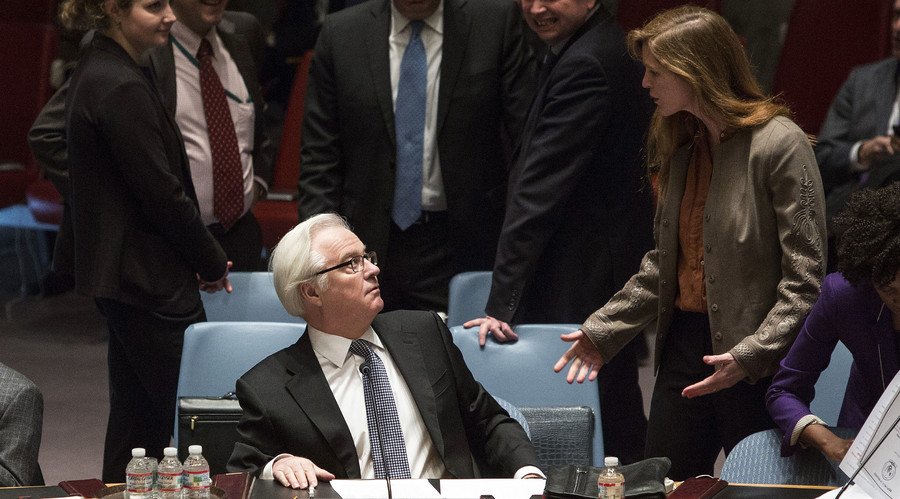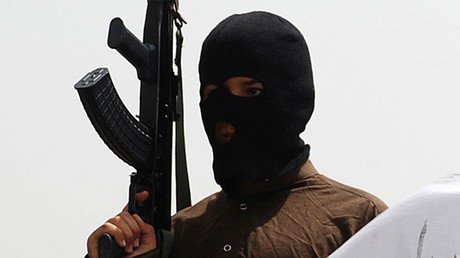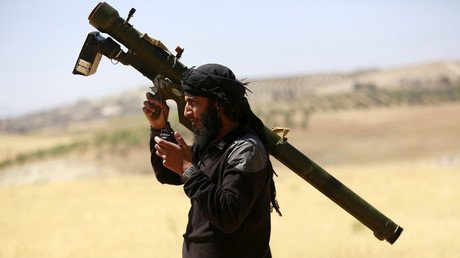Russia urges ‘caution’ on UN’s Syria chemical weapons report, will talk to US
Russia’s UN envoy has called on the international community not to draw “hasty conclusions” from a year-long UN investigation that blames the Syrian government for carrying out two chemical weapons attacks in the past two years, and Islamic State for one.
“We shouldn’t come to hasty conclusions. We need to step very carefully here,” Vitaly Churkin told the Russian media in New York, saying Russia needs more time to study the 95-page report.
The UN Security Council-backed investigation was conducted by the Organization for the Prohibition of Chemical Weapons (OPCW) and the UN’s Joint Investigative Mechanism, a body known as JIM that investigated nine separate chemical weapons attacks that had been previously verified by the OPCW.
All incidents occurred after 2013, when Syria handed over its chemical weapons arsenal to international monitors. In six instances, JIM was not able to definitively apportion blame, in two cases, in Idlib in 2014 and 2015, the report said that government forces had used chlorine gas – which was not removed in 2013 due to its civilian uses, but is forbidden on the battlefield. In one case, Islamic State appeared to have used mustard gas in Marea in August of 2015.
Churkin said that the findings were notable, as “usually all blame gets assigned to the Syrian government.”
He also said that Russia will discuss the findings with the US at the next United Nations session in September.
“JIM was jointly set up by Russia and the US. It was a very complex process, and I have already spoken to [United States UN envoy] Samantha Power, who is currently on vacation. We agreed that as soon as she gets back, we will sit down and decide what we can do on the basis of this report.”

‘Look in the mirror,’ Moscow tells Washington
In a related statement, Russia has bristled at a US call for it to step in and prevent the future use of chemical weapons.
“We condemn in the strongest possible terms the Assad regime's use of chlorine [gas] against its own people,” said a statement released on Wednesday evening by Ned Price, Spokesperson for the National Security Council.
“The United States will work with our international partners to seek accountability through appropriate diplomatic mechanisms, including through the United Nations Security Council and the OPCW. We urge all UN member states and parties to the Chemical Weapons Convention, including Russia and Iran, to participate in this effort.”
In response, Russian Foreign Minister Sergey Lavrov said that the US “should concentrate on its own problems” before making any international appeals.
“They should take a look in the mirror, and do what they promised to do back in January: to separate the ‘loyal’ opposition from the terrorists. They are currently unable or unwilling to do so,” Lavrov said in a statement published on his ministry's website.
Former CIA officer Philip Giraldi also urged refraining from harsh statements and waiting for the full report, which is to be released next week.
“I’d be very interested in seeing the sourcing of the information [in the full report] because too often in the past it turned out that the opposition sources have contrived information to make it look like the government was responsible for the attack and it turned out that this wasn’t the case,” Giraldi told RT.
Despite the US willing to put the blame for all chemical attacks on the Syrian authorities, the “relatively simple” chemicals used in the attacks are “as likely to be sourced to the opposition as they are to the government.”
There has been no let-up in fighting in Syria, where over 400,000 people have died as a result of the fighting since the conflict broke out in 2011.
The Russia-backed Syrian government, NATO and Saudi-supported “moderate” rebels, and radical Islamists are fighting for supremacy in the city of Aleppo, where up to 300,000 civilians remain trapped.
The UN has pushed for a weekly 48-hour truce in the fighting that would allow it to provide humanitarian relief, which has just been endorsed by Russia. According to the plan, food and supplies would be delivered simultaneously by internationally monitored vehicles to rebel and government-controlled areas.















